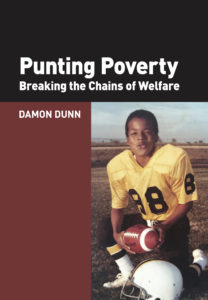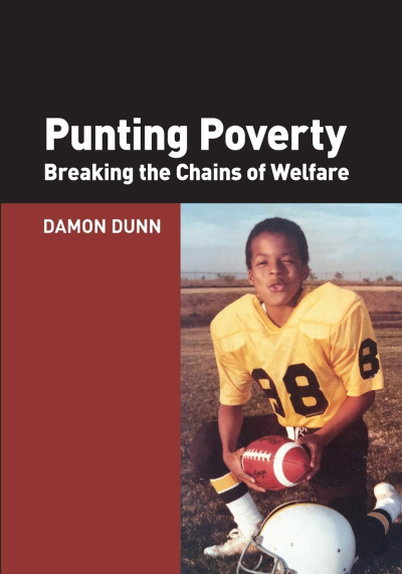 In the new book Punting Poverty, released today by the nonpartisan Pacific Research Institute, former collegiate and pro football player turned entrepreneur Damon Dunn pushes back against the universal basic income movement to give Americans between $500 and $1000 per month – calling it “fool’s gold that does not even attempt to offer economic empowerment.”
In the new book Punting Poverty, released today by the nonpartisan Pacific Research Institute, former collegiate and pro football player turned entrepreneur Damon Dunn pushes back against the universal basic income movement to give Americans between $500 and $1000 per month – calling it “fool’s gold that does not even attempt to offer economic empowerment.”
The book is available now for purchase at Amazon.com and other online booksellers.
In Punting Poverty: Breaking the Chains of Welfare, Dunn recalls growing up in rural Texas outside Fort Worth in a single-wide trailer dependent upon government assistance programs.
“We lived on government support and stayed poor for as long as we relied on those programs. We gamed the system; maintained our eligibility; and survived on the bare minimum that ensures access to every free program possible. But in the end, we did not find economic freedom until my mother got her degree, secured a good job, and paved the way for me to do the same.”
Based on his experiences as a youth, Dunn makes the case that universal basic income would not have helped families like his escape extreme poverty and move up the economic ladder.
“Universal Basic Income would not have done anything more to help move my family out of poverty. Giving my grandparents $500 per month would not have led to socioeconomic mobility or closed the income gap. It would not have enabled us to make a down payment to buy a home, move our family into a better neighborhood with better schools, or pay for college.”
Dunn overcame extreme poverty to attend Stanford University on a football scholarship, later playing football in the NFL and in Europe before founding his own successful business and also contributing to public policy as a Pacific Research Institute fellow in business and economics and previously as a Hoover Institution fellow.
Instead of creating another expensive government welfare program, Dunn proposes what he calls “skills-based economics” – helping every student to achieve at least an Associate’s Degree or a good vocational education geared toward meeting the demands of the workforce – to put all Americans on the path toward getting a good job or starting their own business, moving up the economic ladder, and acquiring wealth.
Dunn writes, “the path to freedom is not accepting the limits of government handouts. The path to freedom is developing marketable skills and seizing opportunities. This is a formula that can be repeated by anyone and at any time if government focuses its efforts, not on handouts that make economic suffering tolerable, but truly equips people to thrive and prosper.”

